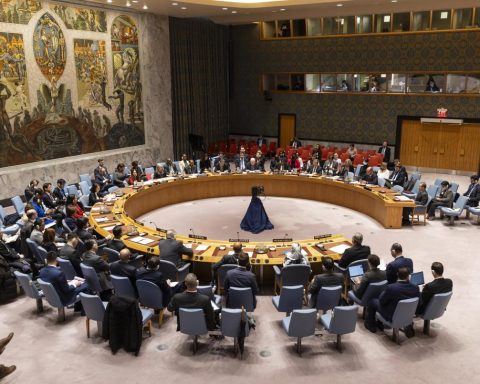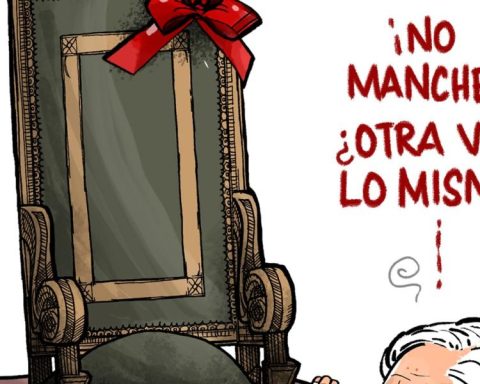The eventual collapse of the administrative agreement signed last March by the factions of the Official Party, the DC and the PDG, which could prevent Deputy Karol Cariola (PC) from becoming the new president of the Lower House, has caused enormous tension in the within the political forces of the Government. These days, the Approve Dignity and Democratic Socialism parties will make one last attempt to maintain the agreement signed a few months ago, prior to the respective vote next Monday, November 7 in the Corporation Chamber, assuming that for the Executive it is essential maintain said space of power, with the aim of making his weak reform program more viable.
Faced with this scenario, one of the protagonists of said discussion, the deputy and president of the Socialist Youth, Juan Santana, refers to the different possibilities that arise from the breach of the word pledged by the benches of the DC and the PDG , which could eventually be negotiating with the right for the emergence of a new House governance agreement. For the official parliamentarian, the decision has nothing to do with the name of Karol Cariola, but is related to an “anti-communist” vision displayed by some opposition sectors, against which, in his opinion, a “very bad precedent” of hindering the exercise of democracy.
Open to discussing with other sectors that were not part of the original agreement signed last March -understanding that only the right was excluded from said agreement-, Santana refers to the possible scenarios that the ruling party faces with this new obstacle to the governance of a sector that since its arrival in La Moneda has faced various complexities. The PS deputy warns that in the coming days the negotiations in the Chamber will be decisive for the future of the political project headed by President Gabriel Boric.
In addition, and in his capacity as president of the Education Commission of the Corporation, the parliamentarian referred to the recent controversy over the decrease in the budget for the Bicentennial High Schools for 2023, a measure that has been strongly criticized by the opposition, including by former President Sebastián Piñera. In this regard, Santana assured that it was in the last administration of the aforementioned former President that the Government’s contributions to said establishments began to be reduced, and that in his opinion, the Executive’s effort should be to promote that successful experiences like this are replicated in all high schools in the country, in the context of a deep crisis in the public education system.
How do you see from Democratic Socialism the possible fall of this governance agreement of the House? How risky can it be for the future of the Government and the viability of its program?
We as socialists are going to respect the administrative agreement, we believe that the PC has the legitimate right to preside over the Chamber this year, and we hope that this will be fulfilled. If along the way there is any other definition by the parties that make up this agreement, that will have to be discussed at the time, but I believe that even in these types of circumstances, it is necessary to advance in a political agreement with those forces that keep their word, because I get the impression that today the dilemma is whether there is democracy in our country or there is populism. In this regard, what those of us who support the management of President Boric’s government have to do is create a climate that allows stability to be given to our political system and to Chilean democracy, to generate the optimal conditions so that the reforms with which we committed ourselves in the campaign period.
Faced with the noise caused by the name Karol Cariola to preside over the Chamber, do you think it is a personal view against the deputy? How do you see your party studying the possibility of nominating another of its parliamentarians, to avoid the fall of the agreement?
I think that if the PC makes the decision to change its candidacy for the presidency, the effect will be the same, because I don’t think that the problem for those who are unaware of the agreement is Deputy Karol Cariola. The problem for them is that a PC parliamentarian presides, and that reveals the anti-communism that unfortunately today in Chile still exists on the part of some sectors. If castling is done, as has been proposed by other benches, I get the impression that the effect would also be the same, because the PC could wonder why if they are contributing with their vote, they would have to be omitted and lower their candidacies. for the purpose benefit from your support. And if it is not a communist who leads the Chamber today, the conditions will not exist for a communist parliamentarian or parliamentarian to be elected tomorrow.
Faced with this scenario and advancing the negotiations that will take place over the next few days, is Democratic Socialism open to negotiating with the right to promote a new administrative agreement? Do you think that would weaken the internal relationship with Approve Dignity?
I think that, if the agreement falls due to ignorance on the part of those who ascribed and signed it, the democratic forces will have to make an effort to generate an understanding with those sectors that give certain verbal guarantees. A precedent was set in the Senate, where the political forces, which were almost evenly distributed, made the decision that, in order to give the Senate stability, it was necessary to reach an agreement between the opposition parties and the ruling parties. There the word was fulfilled, and, therefore, if a situation is generated in the Chamber where, due to the irresponsibility of some benches of not ascribing what they signed a few months ago, some way out would have to be found where those democratic forces that, if they give guarantees of compliance with an agreement, they can give stability to the leadership of the Chamber. If it is necessary to reach an agreement with other parties that were not included in the agreement signed in March, I am at least in favor of that happening.
In addition, and as president of the Education Commission of the Chamber, what is your opinion regarding the Government’s decision to reduce the contribution to the Bicentennial High Schools? Do you think this is a bad precedent, understanding that your program emphasized the strengthening of public education?
I believe that in this debate of the Bicentennial Lyceums there are two things that intersect. The first is that it is necessary to make a precision, because the Bicentennial High Schools work under agreements forged by the Ministry of Education (Mineduc) with each of these establishments, which are presented and in one way or another are carried out through the effort made by the Ministry of Education, but these agreements have not had new calls to add new establishments since 2020. That is, precisely, since the Government of Sebastián Piñera there have been no calls to add to this network of high schools, so that, if you want to say that the Bicentennial High Schools have not been taken into consideration, this is a reality that as a result of the conjunctures comes from the last administration of former President Piñera.
But beyond the political responsibilities, is it possible to avoid that this measure has repercussions in putting an end to a successful educational experience like that? How do you think this new focus of criticism of the Government can be lessened?
After that precision, it is fair to say that we want all high schools to have standards similar to those that the Bicentennial High Schools have today, which have been tremendous experiences for the community and for the parents and guardians of the boys and girls who are part of these establishments. It is important that all high schools have the same conditions, that they have the necessary resources, for which it is essential that the Ministry of Education increase the budget glosses, as it did in this Budget Law that is not yet finished.
In this regard, the reform made to the New Public Education is going to be very important, understanding that public education is going through a very delicate situation, where there are several studies that indicate that there will be a significant deficit of teachers in our country – about 40 % the year 2025-, and therefore what one would expect is that we can effectively push a great budgetary and administrative effort to carry out this task that means the strengthening of public education. But this is not done only by giving continuity to the Liceo Bicentenario, but it is also done by worrying about those establishments that today are going through a more precarious and vulnerable situation, in the face of which the State cannot give up, and rather has to persevere in strengthening these training spaces.


















